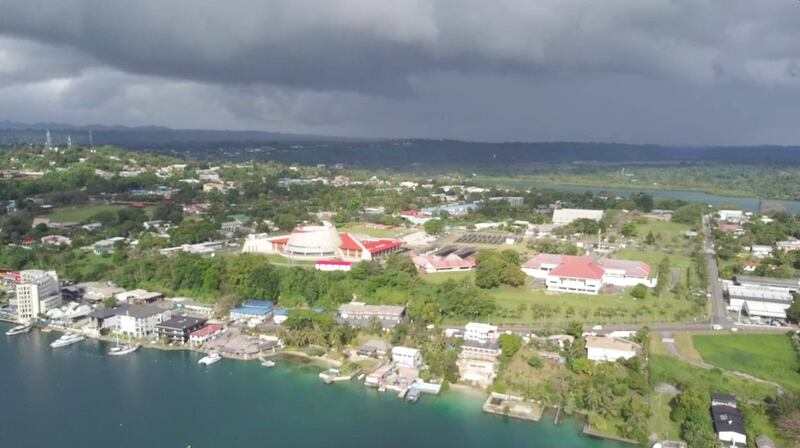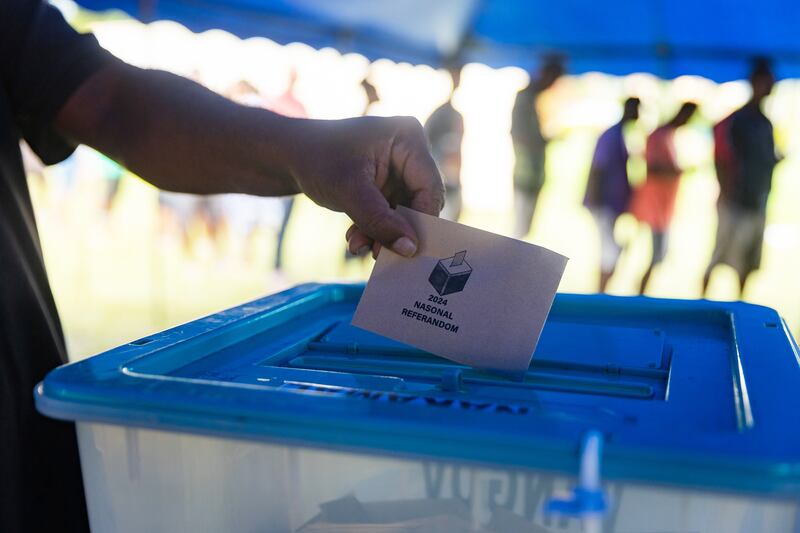It has become something of a truism that there is no political stability in Vanuatu, motions of no confidence are common, and prime ministers rarely serve a full four-year parliamentary term.
Vanuatu's first ever constitutional referendum saw citizens vote overwhelmingly in favor of greater political stability, especially after three prime ministers held office in a space of two months last year.
Two questions on restricting party hopping and forcing newly-elected independent members of parliament to align with political parties were answered with pronounced “yes” votes.
The results were announced on Wednesday evening but official voter participation figures have not been released.
Vanuatu, about 1,900 kilometers (1,180 miles) northeast of the Australian city of Brisbane, is a young country. In 2025, it will mark 45 years since independence in 1980. The constitution has been changed seven times, but this is the first requiring a referendum because it relates to the nation’s electoral system.
For the first decade of its existence as an independent country, Vanuatu’s politics were as stable as they come. The Vanua’aku Pati led by Fr Walter Lini governed for more than 10 years. Since then, a fracturing of political alliances and the rise of independents has led to government by coalition, many being both fragile and fractious.
Hence the volatility. Hence the reforms.

The first referendum question asked, if an MP leaves or is kicked out of their party, should they lose their seat? Ni-Vanuatu voted 59.28 percent in favor of inserting Article 17A into the constitution to enforce this.
The second more contentious question asked if a newly-elected independent MP should be required to join a registered political party within three months of taking office, and if they do not, their seat be vacated? Again the vast majority of voters (57.98 percent) supported the change to Article 17B.
This assumes that stability is a good thing. There is no doubt that ongoing instability is a drain on resources, notably time and energy.
Prime ministers who are constantly watching their backs have little room to drive good policy for the betterment of the nation. But we can certainly point to examples of where too much stability can be sub-optimal.
If the criterion of stability is continuing leadership, Fiji would certainly qualify during the period from 2006 to 2022 under military coup leader, turned elected prime minister Voreqe ‘Frank’ Bainimarama. He led his Fiji First party into government on the country’s return to democracy in 2014.
This ‘stability’ was not very beneficial for Fiji's economy, leaving many in poverty, a health service in crisis, soaring national debt, as well as the negative impacts on human and civil rights documented during that time.
Since being voted out, Bainimarama has been jailed and the Fiji First party is disintegrating.
But assuming that more stability is what is needed and wanted – as these results indicate is the case – will these changes bring that about?
Parliament passed the associated enabling legislation in December last year, with a vote of 47 to none.

In the immediate term of parliament, Article 17A should make unseating a government with a motion of no confidence a little harder but not impossible, partly because there are still independents and micro-parties – parties with only one MP – in parliament.
They currently constitute nine out of a total of 52 seats, and so can wield a large amount of influence where numbers are tight.
The story will be very different after the next election scheduled in 2026, unless another feature of Vanuatu politics occurs, the snap election. Article 17B, which will not take effect until an election, forces all MPs to be aligned with a political party, reinforcing the intention of Article 17A.
Removing the right to sit in parliament as an independent looks like a radical move; no other Pacific countries stop MPs sitting as independents and there is talk this constitution change could be subject to legal challenge.
More fundamentally, these reforms are best seen as tinkering with the machinery of how Vanuatu’s parliament is constituted. They do little or nothing to get to the heart of the matter, which is how political leadership is understood by the governed as well as the governing.
In Vanuatu, as is the case elsewhere in Melanesia, the role of a parliamentarian as a legislator working in the national interest has yet to be fully understood and embraced. MPs are seen, and often see themselves, as gatherers and distributors of resources. This skews how politics operates at elections and on the floor of Parliament.
As Vanuatu embraces these changes and moves on in its political life, more will be needed to build the bedrock of civic education to strengthen political leadership for the future.
Tess Newton Cain is an associate professor and project lead for the Pacific Hub at Griffith Asia Institute, Griffith University. She has worked as an independent consultant and researcher in the South Pacific for more than 25 years. The views expressed here are her own and do not reflect the position of BenarNews.
